| Listing 1 - 10 of 14 | << page >> |
Sort by
|
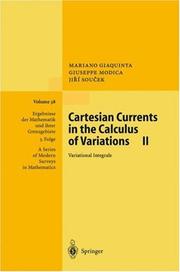
ISSN: 00711136 ISBN: 3540640096 354064010X 3642083757 3662062186 9783540640103 9783540640097 Year: 1998 Volume: 37-38 Publisher: Berlin: Springer,
Abstract | Keywords | Export | Availability | Bookmark
 Loading...
Loading...Choose an application
- Reference Manager
- EndNote
- RefWorks (Direct export to RefWorks)
Non-scalar variational problems appear in different fields. In geometry, for in stance, we encounter the basic problems of harmonic maps between Riemannian manifolds and of minimal immersions; related questions appear in physics, for example in the classical theory of a-models. Non linear elasticity is another example in continuum mechanics, while Oseen-Frank theory of liquid crystals and Ginzburg-Landau theory of superconductivity require to treat variational problems in order to model quite complicated phenomena. Typically one is interested in finding energy minimizing representatives in homology or homotopy classes of maps, minimizers with prescribed topological singularities, topological charges, stable deformations i. e. minimizers in classes of diffeomorphisms or extremal fields. In the last two or three decades there has been growing interest, knowledge, and understanding of the general theory for this kind of problems, often referred to as geometric variational problems. Due to the lack of a regularity theory in the non scalar case, in contrast to the scalar one - or in other words to the occurrence of singularities in vector valued minimizers, often related with concentration phenomena for the energy density - and because of the particular relevance of those singularities for the problem being considered the question of singling out a weak formulation, or completely understanding the significance of various weak formulations becames non trivial.
Calculus of variations. --- Mathematical analysis. --- Analysis (Mathematics). --- Mathematical physics. --- Geometry. --- Calculus of Variations and Optimal Control; Optimization. --- Analysis. --- Theoretical, Mathematical and Computational Physics. --- Mathematics --- Euclid's Elements --- Physical mathematics --- Physics --- 517.1 Mathematical analysis --- Mathematical analysis --- Isoperimetrical problems --- Variations, Calculus of --- Maxima and minima
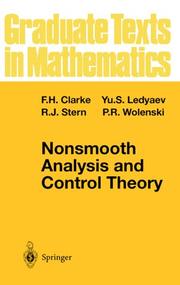
ISBN: 9780387983363 0387983368 9780387226255 9786610145706 1280145706 0387226257 Year: 1998 Volume: 178 Publisher: New York: Springer,
Abstract | Keywords | Export | Availability | Bookmark
 Loading...
Loading...Choose an application
- Reference Manager
- EndNote
- RefWorks (Direct export to RefWorks)
In the last decades the subject of nonsmooth analysis has grown rapidly due to the recognition that nondifferentiable phenomena are more widespread, and play a more important role, than had been thought. In recent years, it has come to play a role in functional analysis, optimization, optimal design, mechanics and plasticity, differential equations, control theory, and, increasingly, in analysis. This volume presents the essentials of the subject clearly and succinctly, together with some of its applications and a generous supply of interesting exercises. The book begins with an introductory chapter which gives the reader a sampling of what is to come while indicating at an early stage why the subject is of interest. The next three chapters constitute a course in nonsmooth analysis and identify a coherent and comprehensive approach to the subject leading to an efficient, natural, yet powerful body of theory. The last chapter, as its name implies, is a self-contained introduction to the theory of control of ordinary differential equations. End-of-chapter problems also offer scope for deeper understanding. The authors have incorporated in the text a number of new results which clarify the relationships between the different schools of thought in the subject. Their goal is to make nonsmooth analysis accessible to a wider audience. In this spirit, the book is written so as to be used by anyone who has taken a course in functional analysis.
Control theory. --- Nonsmooth optimization. --- Théorie de la commande --- Optimisation non différentiable --- Control theory --- Nonsmooth optimization --- Civil & Environmental Engineering --- Engineering & Applied Sciences --- Operations Research --- Mathematics. --- System theory. --- Calculus of variations. --- Calculus of Variations and Optimal Control; Optimization. --- Systems Theory, Control. --- Mathematical optimization. --- Systems theory. --- Systems, Theory of --- Systems science --- Science --- Isoperimetrical problems --- Variations, Calculus of --- Maxima and minima --- Philosophy --- Nonsmooth analysis --- Optimization, Nonsmooth --- Mathematical optimization --- Dynamics --- Machine theory
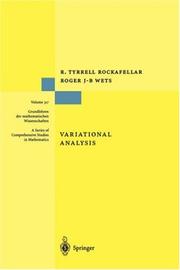
ISSN: 00727830 ISBN: 9783642083044 9783540627722 3540627723 3642024319 9783642024313 3642083048 Year: 1998 Volume: 317 Publisher: Berlin Heidelberg : Springer-Verlag,
Abstract | Keywords | Export | Availability | Bookmark
 Loading...
Loading...Choose an application
- Reference Manager
- EndNote
- RefWorks (Direct export to RefWorks)
From its origins in the minimization of integral functionals, the notion of 'variations' has evolved greatly in connection with applications in optimization, equilibrium, and control. It refers not only to constrained movement away from a point, but also to modes of perturbation and approximation that are best describable by 'set convergence', variational convergence of functions and the like. This book develops a unified framework and, in finite dimension, provides a detailed exposition of variational geometry and subdifferential calculus in their current forms beyond classical and convex analysis. Also covered are set-convergence, set-valued mappings, epi-convergence, duality, maximal monotone mappings, second-order subderivatives, measurable selections and normal integrands. The changes in this 3rd printing mainly concern various typographical corrections, and reference omissions that came to light in the previous printings. Many of these reached the authors' notice through their own re-reading, that of their students and a number of colleagues mentioned in the Preface. The authors also included a few telling examples as well as improved a few statements, with slightly weaker assumptions or have strengthened the conclusions in a couple of instances.
Calculus of variations --- Calcul des variations --- 517.97 --- 517.97 Calculus of variations. Mathematical theory of control --- Calculus of variations. Mathematical theory of control --- Calculus of variations. --- Perturbation (mathématiques) --- Perturbation (Mathematics) --- System theory. --- Calculus of Variations and Optimal Control; Optimization. --- Systems Theory, Control. --- Systems, Theory of --- Systems science --- Science --- Isoperimetrical problems --- Variations, Calculus of --- Maxima and minima --- Philosophy --- Mathematical analysis --- Analyse fonctionnelle non linéaire --- Analyse fonctionnelle non linéaire --- Perturbation (mathématiques)
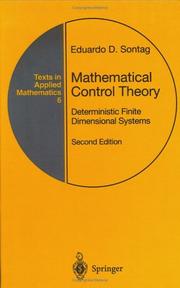
ISBN: 0387984895 1461268257 1461205778 9780387984896 Year: 1998 Volume: 6 Publisher: New York Springer
Abstract | Keywords | Export | Availability | Bookmark
 Loading...
Loading...Choose an application
- Reference Manager
- EndNote
- RefWorks (Direct export to RefWorks)
Mathematics is playing an ever more important role in the physical and biologi cal sciences, provoking a blurring of boundaries between scientific disciplines and a resurgence of interest in the modern as well as the classical techniques of applied mathematics. This renewal of interest, both in research and teaching, has led to the establishment of the series Texts in Applied Mathematics (TAM). The development of new courses is a natural consequence of a high level of excitement on the research frontier as newer techniques, such as numerical and symbolic computer systems, dynamical systems, and chaos, mix with and rein force the traditional methods of applied mathematics. Thus, the purpose of this textbook series is to meet the current and future needs of these advances and to encourage the teaching of new courses. TAM will publish textbooks suitable for use in advanced undergraduate and beginning graduate courses, and will complement the Applied Mathematics Sci ences (AMS) series, which will focus on advanced textbooks and research-level monographs. v Preface to the Second Edition The most significant differences between this edition and the first are as follows: • Additional chapters and sections have been written, dealing with: nonlinear controllability via Lie-algebraic methods, variational and numerical approaches to nonlinear control, including a brief introduction to the Calculus of Variations and the Minimum Principle, - time-optimal control of linear systems, feedback linearization (single-input case), nonlinear optimal feedback, controllability of recurrent nets, and controllability of linear systems with bounded controls.
Mathematical control systems --- Control theory --- System Analysis --- 519.71 --- System analysis --- Network theory --- Systems analysis --- System theory --- Mathematical optimization --- Dynamics --- Machine theory --- Control systems theory: mathematical aspects --- 519.71 Control systems theory: mathematical aspects --- Network analysis --- Network science --- System analysis. --- Calculus of variations. --- Physics. --- Computational intelligence. --- Calculus of Variations and Optimal Control; Optimization. --- Mathematical Methods in Physics. --- Numerical and Computational Physics, Simulation. --- Computational Intelligence. --- Intelligence, Computational --- Artificial intelligence --- Soft computing --- Natural philosophy --- Philosophy, Natural --- Physical sciences --- Isoperimetrical problems --- Variations, Calculus of --- Maxima and minima --- Control theory. --- Systèmes, Théorie des --- Theorie du controle --- Calcul des variations --- Controle deterministe --- Optimisation --- Controle optimal
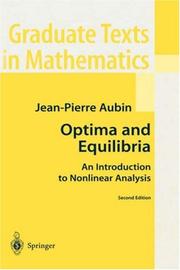
ISSN: 00725285 ISBN: 9783540649830 3540649832 364208446X 3662035391 Year: 1998 Volume: 140 Publisher: Berlin: Springer,
Abstract | Keywords | Export | Availability | Bookmark
 Loading...
Loading...Choose an application
- Reference Manager
- EndNote
- RefWorks (Direct export to RefWorks)
Advances in game theory and economic theory have proceeded hand in hand with that of nonlinear analysis and in particular, convex analysis. These theories motivated mathematicians to provide mathematical tools to deal with optima and equilibria. Jean-Pierre Aubin, one of the leading specialists in nonlinear analysis and its applications to economics and game theory, has written a rigorous and concise-yet still elementary and self-contained- text-book to present mathematical tools needed to solve problems motivated by economics, management sciences, operations research, cooperative and noncooperative games, fuzzy games, etc. It begins with convex and nonsmooth analysis,the foundations of optimization theory and mathematical programming. Nonlinear analysis is next presented in the context of zero-sum games and then, in the framework of set-valued analysis. These results are applied to the main classes of economic equilibria. The text continues with game theory: noncooperative (Nash) equilibria, Pareto optima, core and finally, fuzzy games. The book contains numerous exercises and problems: the latter allow the reader to venture into areas of nonlinear analysis that lie beyond the scope of the book and of most graduate courses. -(See cont. News remarks).
Nonlinear theories --- Mathematical analysis --- Economics, Mathematical --- Théories non linéaires --- Analyse mathématique --- Mathématiques économiques --- Game theory --- Equilibrium (Economics) --- Théories non linéaires --- Analyse mathématique --- Mathématiques économiques --- Functional analysis. --- Applied mathematics. --- Engineering mathematics. --- Mathematical analysis. --- Analysis (Mathematics). --- Economic theory. --- System theory. --- Calculus of variations. --- Functional Analysis. --- Applications of Mathematics. --- Analysis. --- Economic Theory/Quantitative Economics/Mathematical Methods. --- Systems Theory, Control. --- Calculus of Variations and Optimal Control; Optimization. --- Isoperimetrical problems --- Variations, Calculus of --- Maxima and minima --- Systems, Theory of --- Systems science --- Science --- Economic theory --- Political economy --- Social sciences --- Economic man --- 517.1 Mathematical analysis --- Engineering --- Engineering analysis --- Functional calculus --- Calculus of variations --- Functional equations --- Integral equations --- Philosophy --- Mathematics
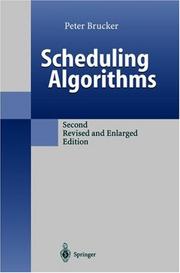
ISBN: 354064105X 3662036142 3662036126 Year: 1998 Publisher: Berlin Springer
Abstract | Keywords | Export | Availability | Bookmark
 Loading...
Loading...Choose an application
- Reference Manager
- EndNote
- RefWorks (Direct export to RefWorks)
Besides scheduling problems for single and parallel machines and shop scheduling problems the book covers advanced models involving due-dates, sequence dependent changeover times and batching. Also multiprocessor task scheduling and problems with multipurpose machines are discussed. The methods used to solve these problems are linear programming, dynamic programming, branch-and-bound algorithms, and local search heuristics. Complexity results for the different classes of deterministic scheduling problems are summarized.
658.513 --- Computer capacity --- -Production scheduling --- Job scheduling (Production control) --- Job-shop scheduling --- Project scheduling (Production control) --- Scheduling (Management) --- Production control --- Scheduling --- Capacity, Computer --- Electronic data processing --- Supervision of production work. Follow-up, progressing, expediting. Scheduling --- Planning --- 658.513 Supervision of production work. Follow-up, progressing, expediting. Scheduling --- Computer algorithms --- Production scheduling --- Algorithms --- Organization. --- Planning. --- Calculus of variations. --- Computer organization. --- Computational complexity. --- Calculus of Variations and Optimal Control; Optimization. --- Computer Systems Organization and Communication Networks. --- Complexity. --- Complexity, Computational --- Machine theory --- Organization, Computer --- Electronic digital computers --- Isoperimetrical problems --- Variations, Calculus of --- Maxima and minima --- Creation (Literary, artistic, etc.) --- Executive ability --- Management --- Organization --- Organisation
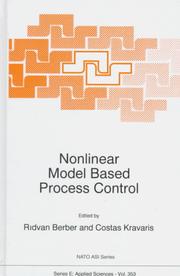
ISBN: 0792352203 9401061408 940115094X 9780792352204 Year: 1998 Volume: 353 Publisher: Dordrecht: Kluwer Academic Publishers,
Abstract | Keywords | Export | Availability | Bookmark
 Loading...
Loading...Choose an application
- Reference Manager
- EndNote
- RefWorks (Direct export to RefWorks)
The ASI on Nonlinear Model Based Process Control (August 10-20, 1997~ Antalya - Turkey) convened as a continuation of a previous ASI which was held in August 1994 in Antalya on Methods of Model Based Process Control in a more general context. In 1994, the contributions and discussions convincingly showed that industrial process control would increasingly rely on nonlinear model based control systems. Therefore, the idea for organizing this ASI was motivated by the success of the first one, the enthusiasm expressed by the scientific community for continuing contact, and the growing incentive for on-line control algorithms for nonlinear processes. This is due to tighter constraints and constantly changing performance objectives that now force the processes to be operated over a wider range of conditions compared to the past, and the fact that many of industrial operations are nonlinear in nature. The ASI intended to review in depth and in a global way the state-of-the-art in nonlinear model based control. The list of lecturers consisted of 12 eminent scientists leading the principal developments in the area, as well as industrial specialists experienced in the application of these techniques. Selected out of a large number of applications, there was a high quality, active audience composed of 59 students from 20 countries. Including family members accompanying the participants, the group formed a large body of92 persons. Out of the 71 participants, 11 were from industry.
Process control --- Nonlinear control theory --- 681.52 --- #TELE:SISTA --- 681.52 Automatic control systems and controllers according to the principle of action --- Automatic control systems and controllers according to the principle of action --- Control of industrial processes --- Industrial process control --- Automatic control --- Manufacturing processes --- Quality control --- Control theory --- Nonlinear theories --- Chemical engineering. --- Electrical engineering. --- Mechanical engineering. --- Calculus of variations. --- Industrial Chemistry/Chemical Engineering. --- Electrical Engineering. --- Mechanical Engineering. --- Calculus of Variations and Optimal Control; Optimization. --- Isoperimetrical problems --- Variations, Calculus of --- Maxima and minima --- Engineering, Mechanical --- Engineering --- Machinery --- Steam engineering --- Electric engineering --- Chemistry, Industrial --- Engineering, Chemical --- Industrial chemistry --- Chemistry, Technical --- Metallurgy --- Process control. --- Nonlinear control theory.

ISSN: 03029743 ISBN: 9783540645900 354064590X 3540693467 Year: 1998 Volume: 1412 Publisher: Berlin: Springer,
Abstract | Keywords | Export | Availability | Bookmark
 Loading...
Loading...Choose an application
- Reference Manager
- EndNote
- RefWorks (Direct export to RefWorks)
Integer programming --- Combinatorial optimization --- Congresses --- Computer science. --- Algorithms. --- Computer science --- Calculus of variations. --- Combinatorics. --- Computer Science. --- Algorithm Analysis and Problem Complexity. --- Discrete Mathematics in Computer Science. --- Calculus of Variations and Optimal Control; Optimization. --- Mathematics. --- Programming (Mathematics) --- Computer software. --- Computational complexity. --- Mathematical optimization. --- Combinatorics --- Algebra --- Mathematical analysis --- Optimization (Mathematics) --- Optimization techniques --- Optimization theory --- Systems optimization --- Maxima and minima --- Operations research --- Simulation methods --- System analysis --- Complexity, Computational --- Electronic data processing --- Machine theory --- Software, Computer --- Computer systems --- Computer science—Mathematics. --- Isoperimetrical problems --- Variations, Calculus of --- Algorism --- Arithmetic --- Foundations --- Integer programming - Congresses --- Combinatorial optimization - Congresses
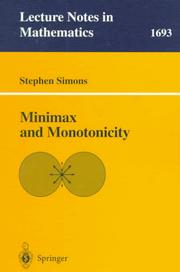
ISBN: 3540647554 3540689311 9783540647553 Year: 1998 Volume: 1693 Publisher: Berlin: Springer,
Abstract | Keywords | Export | Availability | Bookmark
 Loading...
Loading...Choose an application
- Reference Manager
- EndNote
- RefWorks (Direct export to RefWorks)
Functional analysis --- Monotonic functions --- Maxima and minima --- Duality theory (Mathematics) --- Monotone operators --- Calculus --- Mathematical Theory --- Mathematics --- Physical Sciences & Mathematics --- Dualiteit [Theorie van de ] (Wiskunde) --- Dualité [Théorie de la ] (Mathématiques) --- Fonctions monotones --- Functies [Monotoon ] --- Functions [Monotonic ] --- Mathematics duality theory --- Maxima en minima --- Maxima et minima --- Monotone functies --- Monotone operatoren --- Opérateurs monotones --- Theorie van de dualiteit (Wiskunde) --- Théorie de la dualité (Mathématiques) --- Opérateurs monotones --- Dualité, Principe de (Mathématiques) --- Functional analysis. --- Operator theory. --- System theory. --- Calculus of variations. --- Functional Analysis. --- Operator Theory. --- Systems Theory, Control. --- Calculus of Variations and Optimal Control; Optimization. --- Isoperimetrical problems --- Variations, Calculus of --- Systems, Theory of --- Systems science --- Science --- Functional calculus --- Calculus of variations --- Functional equations --- Integral equations --- Philosophy --- Monotone operators. --- Algebra --- Mathematical analysis --- Topology --- Operator theory
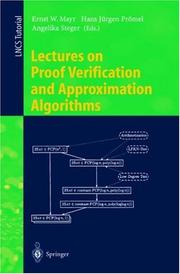
ISSN: 03029743 ISBN: 3540642013 9783540642015 3540697012 Year: 1998 Volume: 1367 Publisher: Berlin: Springer,
Abstract | Keywords | Export | Availability | Bookmark
 Loading...
Loading...Choose an application
- Reference Manager
- EndNote
- RefWorks (Direct export to RefWorks)
During the last few years, we have seen quite spectacular progress in the area of approximation algorithms: for several fundamental optimization problems we now actually know matching upper and lower bounds for their approximability. This textbook-like tutorial is a coherent and essentially self-contained presentation of the enormous recent progress facilitated by the interplay between the theory of probabilistically checkable proofs and aproximation algorithms. The basic concepts, methods, and results are presented in a unified way to provide a smooth introduction for newcomers. These lectures are particularly useful for advanced courses or reading groups on the topic.
Algorithmes (Ordinateur) --- Algoritmen (Computer) --- Approximatietheorie --- Approximation theory --- Automatic theorem proving --- Computer algorithms --- Theorema's--Automatische bewijsvoering --- Théorie des approximations --- Théorèmes--Démonstration automatique --- Computer Science --- Engineering & Applied Sciences --- Theory of approximation --- Automated theorem proving --- Theorem proving, Automated --- Theorem proving, Automatic --- Computer science. --- Computers. --- Algorithms. --- Computer science --- Calculus of variations. --- Combinatorics. --- Computer Science. --- Theory of Computation. --- Algorithm Analysis and Problem Complexity. --- Discrete Mathematics in Computer Science. --- Computation by Abstract Devices. --- Calculus of Variations and Optimal Control; Optimization. --- Mathematics. --- Information theory. --- Computer software. --- Computational complexity. --- Mathematical optimization. --- Optimization (Mathematics) --- Optimization techniques --- Optimization theory --- Systems optimization --- Mathematical analysis --- Maxima and minima --- Operations research --- Simulation methods --- System analysis --- Complexity, Computational --- Electronic data processing --- Machine theory --- Software, Computer --- Computer systems --- Communication theory --- Communication --- Cybernetics --- Combinatorics --- Algebra --- Informatics --- Science --- Computer science—Mathematics. --- Isoperimetrical problems --- Variations, Calculus of --- Algorism --- Arithmetic --- Automatic computers --- Automatic data processors --- Computer hardware --- Computing machines (Computers) --- Electronic brains --- Electronic calculating-machines --- Electronic computers --- Hardware, Computer --- Calculators --- Cyberspace --- Foundations
| Listing 1 - 10 of 14 | << page >> |
Sort by
|

 Search
Search Feedback
Feedback About UniCat
About UniCat  Help
Help News
News